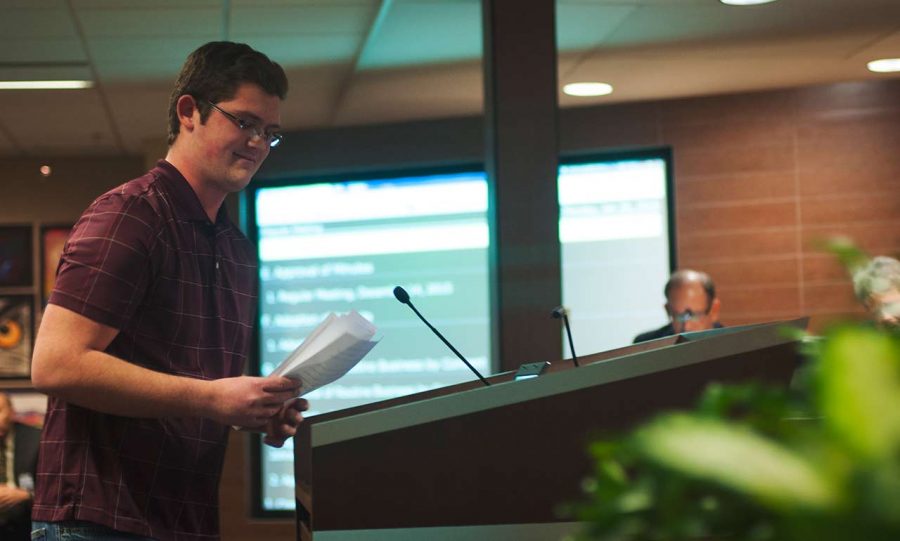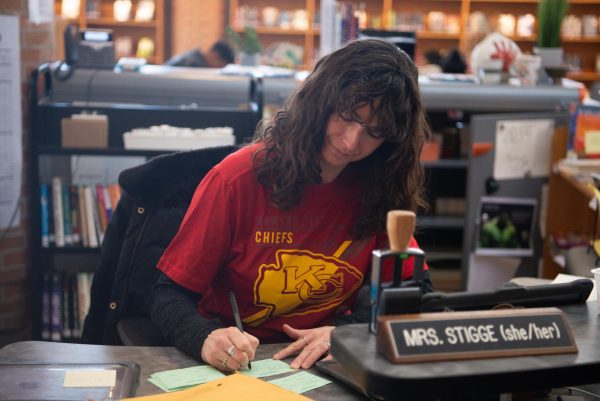IBelieve
February 26, 2016
IB students generate a petition and speak before the Board to protest the elimination of the International Baccalaureate (IB) program
Cadie Elder + Sophie FloresAt 6:50 p.m. in the lobby of the McEachen Administrative Center, students waited apprehensively for the Board of Education meeting to start. In one corner of the room, seniors Julia Sokolenko, Nick Senior and Braden Pomerantz were scrutinizing the speech.
“How many pages is it?”
“Seven, but it’s in a huge font.”
Sophie Tomasic arrived and announced, “The petition just hit 1,000 signatures.”
Amelia Guglielmi rushed in with the shortened version of the speech, smeared with ink. She and Braden went over last-minute fixes.
“This is a good quote that’s not really relevant,” Guglielmi said. “And I left that in but took out the 2010 study…”
At 7 p.m., people started to file into the meeting room, side-stepping Pomerantz, who was delivering his speech to the wall under his breath.
The podium where he would speak stood between the panel of 10 district board members and the front row of sky-blue IB t-shirts and orange and black NW letterman jackets. All available seating was taken, forcing some students and parents to stand in the back corner or sit on the floor by the entrance.
The meeting began with announcements, acknowledgments of achievements, news of website developments, building reconstruction and maintenance projects. The applause at the end of each order of business was glaringly loud.
When the board reached item D1 on the agenda — the open forum — board president Sara Goodburn set the guidelines.
“Tonight we have quite a few , so we’re going to hold to three minutes,” Goodburn said.
The first speaker, Linda McCormick, brought up an issue with the technology initiative. The second speaker, Dorothy Warner, didn’t show. Then it was Northwest’s turn.
Pomerantz, who had taken the spot on the floor closest to the door, got to his feet. The applause got sharper.
He faced the board, which was a relief because he’d had the impression that he would have to address the entire room.
“As I started, I realized my hand was shaking,” Pomerantz said. “My left hand. More than I’ve ever shaken before. And it was going crazy, and I was like, ‘This is so embarrassing; stop shaking.’ And so I clenched my fist and pressed it against the podium so that no one would see it.”
The speech highlighted the unique benefits of the International Baccalaureate program, as well as counterarguments for factors like low participation and low college credit. (For a full transcript of the speech, go to smnw.com.)
“Halfway through the speech, though, I started to calm down.” Pomerantz said. “I stopped being a bobblehead, and I was able to look up a lot more and speak directly to each of the members. Something that I really wanted to do was look at all of them, present to them, because I hate just reading a speech. I think that’s terrible.”
The students nodded, as if saying, ‘That’s right. That’s just what I would say.’ Pomerantz was saying what they were all thinking. He was presenting the product of all their work and dedication.
When he finished, the applause was long and triumphant. His peers attempted to suppress their grins.
But it wasn’t an open dialogue. The board didn’t respond.
“Thank you,” Goodburn said. “Our next speaker…”
Get With the Program
The students packed a powerful message into their three-minute time slot Jan. 25th. It was their response to the SMSD board’s proposal to exclude IB from their academic program.
The proposal surfaced first at a meeting Jan. 11 with counselors, principals and the IB coordinators from the three participating high schools. At the meeting, chief academic officer Ed Streich went over proposed changes to next year’s curriculum. The last slide of the presentation was about IB, stating the last group of IB students in the district would be in the current sophomore class.
“I was instructed at that meeting — as was everyone else — that we were not to tell anyone what is going on,” NW IB coordinator Janine Deines said.
The events that followed happened in quick succession.
Jan. 20: Superintendent Jim Hinson mentioned in a public Q&A called a Super Chat at Indian Woods Middle School that the board was planning to cut back on the IB program, inciting a conversation on Twitter.
Jan. 21: Deines explained the situation to the IB Diploma Theory of Knowledge class, who immediately decided to take action.
Jan. 22: The board posted the agenda for the upcoming meeting, where the students planned to speak.
“ morning, I talked about it with my students, and originally, on the agenda, IB was listed,” Deines said. “An hour later, it was gone.”
The board had decided to delay making any decision about the future of IB. IB was no longer an issue in the upcoming meeting, but, according to Streich the discussion will resume in the summer. However, students still believed it was important to make their views known to the board.
“Not one person was like, ‘Well, we don’t need to go anymore,’” Pomerantz said. “We understood that even though it was being taken off the agenda, that doesn’t mean that IB’s being saved at all. That doesn’t prevent them from bringing it up in another meeting and making that vote. I think we all understood that we might not be able to change their minds. But that wasn’t necessarily what drove us to do this.”
It is certain that IB will be available for this year’s sophomores, but the ruling is still up in the air for the freshmen who might enroll in IB for the 2017-2018 school year.
“The process will begin with building leadership,” Streich said. “They will help guide the process. Our building administrators will help who the stakeholders would be for each of the five high schools. We will work through the summer into the fall. The goal would be that the 2017-18 program of studies would be reflective of that process.”
According to Streich, the issue is not money. Still, it costs Northwest approximately $38,000 to cover expenses such as teacher training, substitutes for when teachers are absent to administer exams and postage for materials that are shipped in and out of the country. The budget does not include testing and registration fees, which the students pay.
It costs IB Diploma Candidates $842 over the junior and senior years. IB Course Candidates pay a one-time registration fee of $164 and $113 per test, while the fee for an AP exam is $92.
“We are not getting any more money from the state,” Streich said. “When you have limited funds, you begin to evaluate all programs — and it’s not just IB — to ensure that you are getting the most positive student outcomes with the resources you have available.”
An Open-Ended Outcome for an Open-Ended Program
IB students used social media and reached out to IB alumni to help defend their cause. Tomasic created the “Save the IB Program” petition and contacted The Shawnee Dispatch.
“, we could get people to share their stories,” Tomasic said. “We thought that would be a good way to reach former IB students, former parents. I would say a majority of people weren’t even NW kids.”
Students began sharing the petition and writing links to the petition on whiteboards all over the school. Senior Ian Boyd created a Facebook group inviting IB students from Northwest and SM East. The effort to save the program became a conversation involving students and staff throughout the building.
“After we went to the meeting and presented our views, it was so cool the response we got coming back Tuesday,” Pomerantz said. “ came up and fist-bumped me. Tess Holcom was like, ‘In my AP stats class today, you all were the topic of conversation.’ Teachers told my sister that all over Facebook are links to the articles about what we did.”
After the meeting, Streich approached Pomerantz and commended him on what a difference his speech had made. He remarked that the board meeting showed how student representation can have an impact.
“I thought they were remarkable in that they shared their opinions,” Streich said. “That’s part of the reason boards of education have a public comment section. They are representative of the community.”
The board will consider a number of options for the fate of the IB program.
“Do we continue to offer IB?” Streich said. “Do we continue to offer IB at all three high schools? Do we expand IB to other high schools? Do we move IB to one high school? There are a lot of different options out there.”
Students are worried and waiting for answers, but Streich advises they remain calm because no decision will be made in the immediate future.
“We are going to go slow. We are going to try to make the best possible decision based on the evidence we have available,” Streich said. “At this point, take that worry off and just focus on improving your performance within the IB Program.”
Streich says that the students’ performance on the IB tests could make a difference, and one of the reasons the board gave for cutting IB was low test scores.
The IB Diploma candidates succeeded in starting a district-wide dialogue that will ensure full consideration for academic programs, all in less than a week.
“It’s been really cool to see what we’ve been able to do,” Pomerantz said. “It’s the first time in our lives we’ve felt like we did something really important. We’re not doing this for ourselves. We have learned from . It’s something we think is fantastic, and it’s something that we think other people should be able to enjoy as well.”









